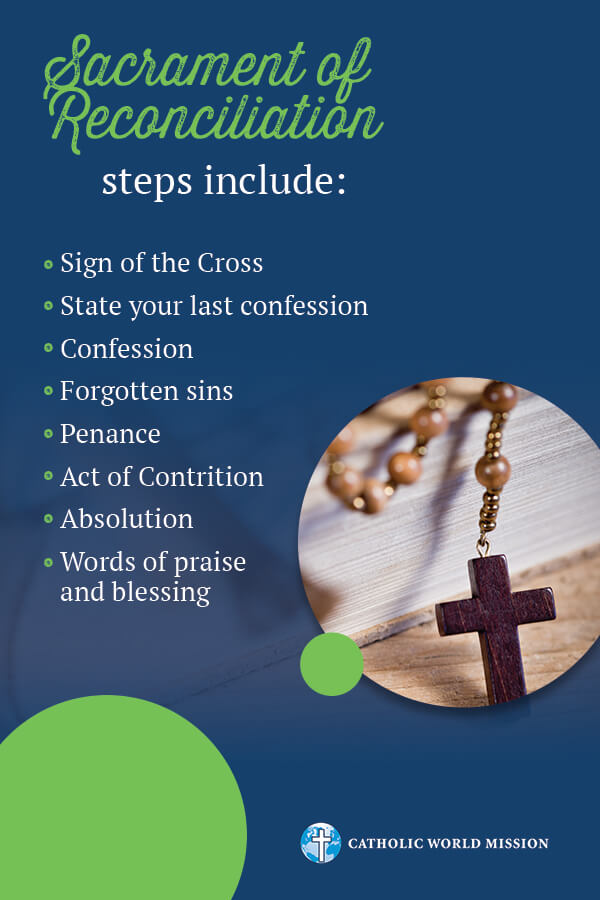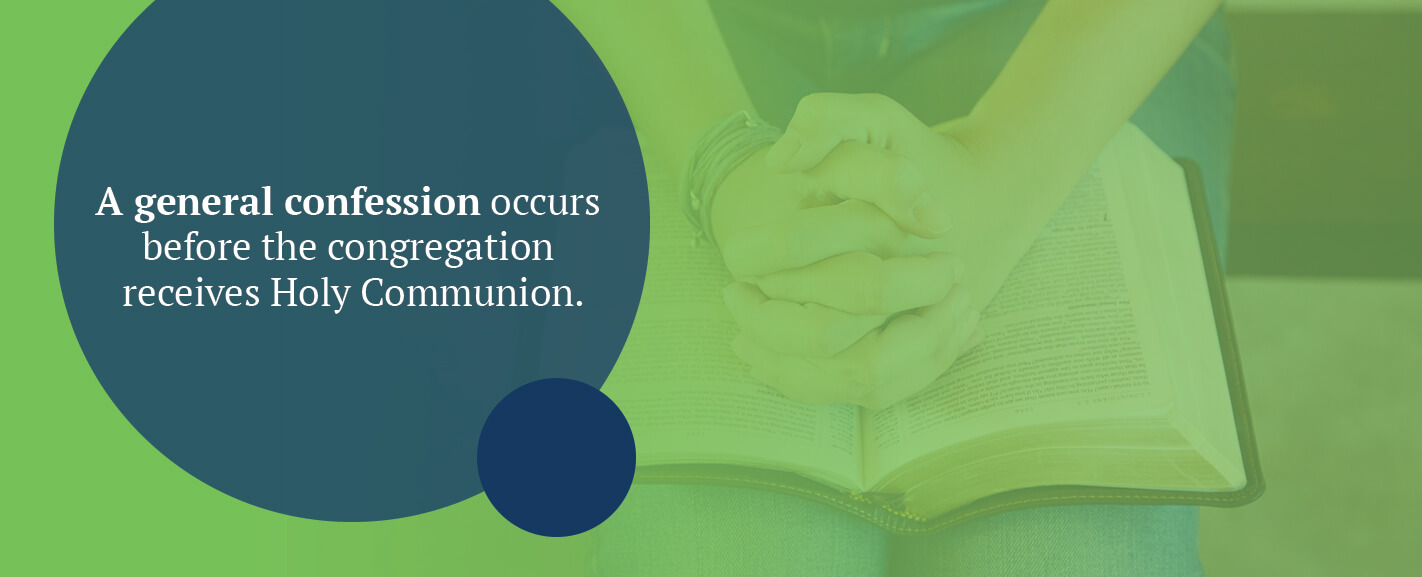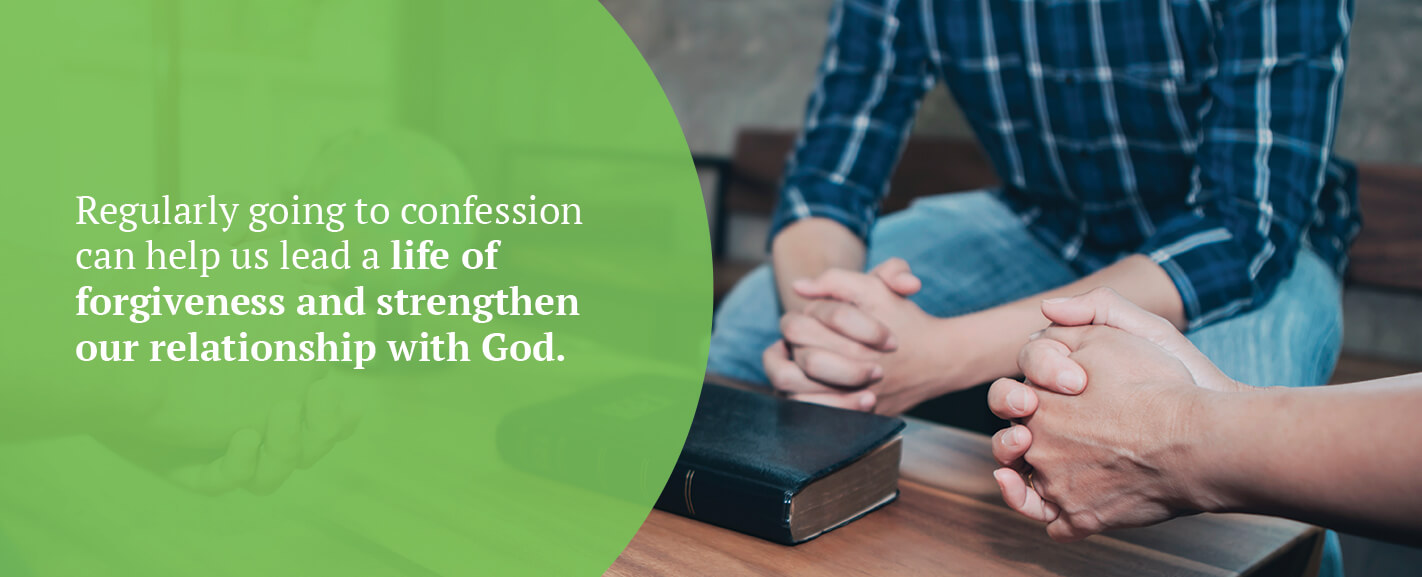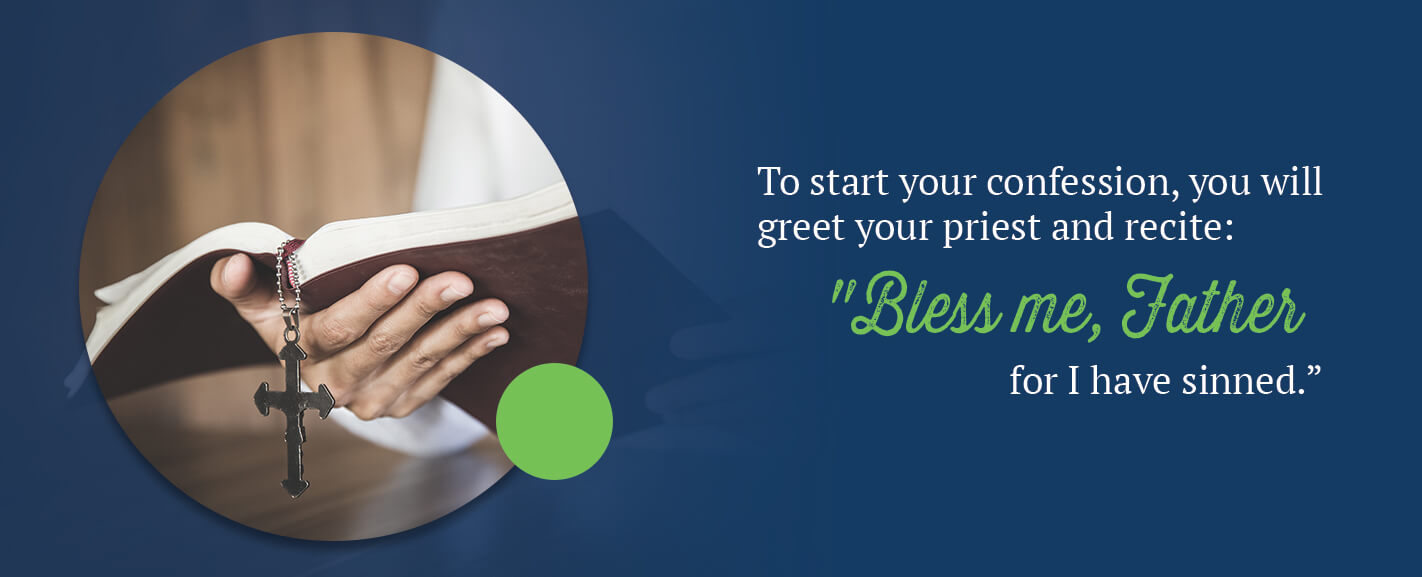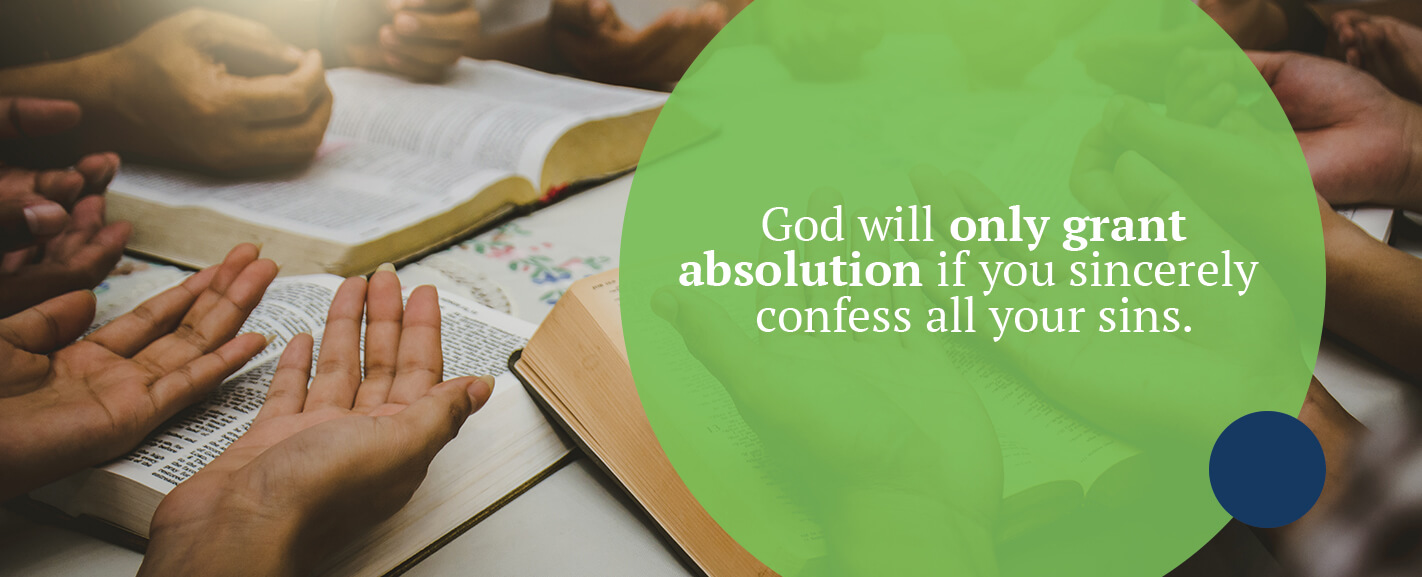
The Sacrament of Confession, also known as Reconciliation, is a beautiful opportunity that allows all of us to renounce the sins we have committed and seek absolution. In His endless mercy and love, God absolves us of our sins and forgives our mistakes, allowing us to reconcile with the Church and God. The meaning of confession and its value helps you realize your mistakes and cleanse your soul of sin.
Following confession, you will receive penance to atone for your sins and are granted absolution. Our Catholic confession guide for adults can help you get the most out of your confession. View our traditional Catholic guide to confession and learn more about confession.
Help Support Catholic World Mission
Jump to Section:
- What Should You Expect From Confession?
- When Should You Go to Confession?
- What Do You Say At Confession?
- Formal Dialogue Between Priest and Confessor
- Types of Sin
- Absolution from Sin
- What Happens After Confession
- Send Prayer Intentions to Catholic World Mission
What Should You Expect From Confession?
A Catholic Church confession is a freeing experience to cleanse the soul, strengthen your will and bring you closer to God. While confession can be a healing experience, it is normal for people to feel nervous or even afraid to go to confession because they may be unfamiliar with the process. It’s important to remember that confessions are confidential, creating a private and safe space for you to ask for forgiveness for your sins.
When you go to confession, you will speak with a Catholic priest who has been given the power to forgive sins by Christ. Catholic priests are filled with God’s love and are willing to forgive our sins if we go to confession and repent. Confession can also be a powerful one-on-one experience with you and the Lord. While each confession is a unique experience, the Sacrament of Reconciliation steps include:
- Sign of the Cross: Confession begins with the Sign of the Cross. Additionally, you can offer a simple greeting to the priest and say hello or good morning.
- State your last confession: After your greeting, you can begin your confession by saying how long it’s been since your last confession. For example, if it’s been a year, you would say, “Bless me, Father, for I have sinned. My last confession was one year ago.”
- Confession: It is now time to confess your sins, asking for forgiveness and opening dialogue with God himself. The priest stands in the name of the Church and Christ, who will guide you towards a healing and helpful confession. If you are unsure of what to say at confession, you can ask the priest for help. At confession, always remember you are putting your faith in trust in Christ, our merciful God who wants to forgive you of your sins.
- Forgotten sins: While you may remember several sins you want to confess, no one expects you to remember every sin you have committed since your last confession. We are, after all, only human. If you make a sincere confession, all your sins — even the few you forgot — will be absolved.
- Penance: Following your confession, the priest will assign penance for your sins. This penance supports your spiritual health and can help you grow and heal from your sins. Penance may include an offering, sacrifice, service, prayer or work of mercy. All forms of penance help the person strengthen their bond to Christ.
- Act of Contrition: After receiving your penance, you will pray an Act of Contrition, which allows you to express your sorrow for the sins you have committed in life. Most Catholics use a version of the Prayer of Sorrow, also known as the Act of Contrition prayer.
- Absolution: Acting in the person of Christ, the priest can absolve you of your sins by reciting the Prayer of Absolution. As the prayer comes to an end, the penitent will respond with “Amen” while making the Sign of the Cross.
- Words of praise and blessing: To finalize your confession, the priest will express a blessing and words of praise. The penitent will then leave and ensure they do their penance to be forgiven for their sins.
When Should You Go to Confession?
According to Canon law, it is recommended that you go to confession at least once a year. However, if you prefer to go more often, you can attend confession on a regular basis. Most Catholics attend confession in the weeks leading up to the major holy days — during Advent to prepare for the birth of Jesus at Christmas and also during Lent to prepare for Easter and the Resurrection. The purpose of attending confession during these times is to prepare one’s soul to welcome Jesus anew.
During the Catholic Mass, a general confession occurs before the congregation receives Holy Communion. Catholics recite the Confiteor prayer during the Penitential Rite, acknowledging their venial sins, and the priest will grant a General Absolution to prepare everyone to receive the Body and Blood of Christ through Communion. However, if someone commits a mortal sin — a grave act that severs the sinner’s relationship with God — they must receive Individual Absolution in confession before partaking of Communion.
It is important not to look at confession as a requirement or something you have to do. Instead, you should view confession as a gift — it is a beautiful sacrament and a testament of His mercy. It’s also an opportunity to receive His love, grow and strengthen your faith. Confession allows us to repair our relationships with the Church and God and helps us receive God’s grace.
People should confess because they love God and want to repair their relationship with Him — not because they feel obligated to confess or fear retribution. Confession requirements are simply in place to help us lead a life closer to God and walk along the path of eternal life.
Another important aspect of confession to consider is how it helps us lead a better life. While many people rightfully choose to go to confession for absolution of the sins they are aware of committing, confession can also help us learn how to avoid sin and temptation. The priest can offer helpful counsel in this respect because although he is acting in God’s place to absolve sins, he is still a human being striving to live a holy life.
Regularly going to confession can help us lead a life of forgiveness and strengthen our relationship with God. Proper confession is followed by acceptance, support, help and love from yourself and others, bringing a sense of connection. Confession also brings us peace, knowing we are absolved of our sins and are living in His eternal light. Regularly going to confession can also strengthen our will and help us follow in Jesus’ footsteps, something all the faithful are called to do.
What Do You Say at Catholic Confession?
While confession is a healing act, many people may wonder what do you say when you go to confession or how to go to confession most effectively. Read our Catholic guide to confession to learn more about what happens before, during and after confession and how to prepare for confession.
Some of the most helpful steps to Catholic Confession for a healing experience include:
1. Pray for Guidance
While many people think the first step to confession is to speak with your priest, it begins before visiting your church. One of the first steps is praying before confession and asking the Holy Spirit to guide you and help you understand the sins you have committed. While we may remember several sins we have committed, it is certainly possible we may forget certain sins.
Even though we will be forgiven for the sins we have forgotten, mentioning them specifically can be a freeing experience and help cleanse the soul. You have to recognize your own sins and demonstrate a desire to change and heal. Praying can be a useful first step to absolution.
2. Examine Your Conscience
Once you have looked inward and determined you want to change and grow as a person, you should examine your conscience. Examining your conscience begins by acknowledging you are strong in God’s loving embrace and you trust God will take care of and provide for you. Placing trust in God and His love helps you open your soul and ask for forgiveness of your sins. Recognizing all the good God brings to your life can strengthen your faith and help you achieve a more healing confession.
It is important not to rush this step, and many people examine their conscience daily to acknowledge their sins and tendency to stray from God. Examining your daily life and behavior can help you understand what situations you may be more likely to sin or what sins you regularly commit.
Tracing your behaviors and patterns can help you not only recognize the sin itself but the root cause of the sin, helping you avoid these sins in the future.
3. Express Sorrow
The only way to truly grow from your sins is to express genuine sorrow. While we are all human and make mistakes, it is important to show sorrow for these actions as a way to grow. A proper confession begins with a person who is truly sorry for the sins they have committed and is determined to restore their relationship with God and the church.
If you are truly sorry for your sins, pray and commit to going to confession as soon as possible, and God will absolve your sins as long as you follow through with your penance.
4. Go to Your Church Confessional
Once you have examined your conscience, prayed and expressed genuine remorse and sorrow for your sins, you can go to confession. At confession, it is important to be as honest and open with your priest as possible. Confession is a safe place to express your sorrow and confess your sins, allowing you to reach true absolution and forgiveness for your sins.
5. Perform Your Penance
After confession, you will be given penance by your priest. Performing your penance helps you strengthen your relationship with God and find true absolution.
6. Strive to Avoid Future Temptations
While asking for forgiveness for your sins and doing penance is important, it is also essential you continually strive to avoid sin and temptation. While we may inadvertently sin, you should not commit sins with the knowledge that you can later confess them and get a “clean slate.” True, sincere confession involves a continual effort to do and be better.
Formal Dialogue Between the Priest and Confessor
To start your confession, you will greet your priest and recite “Bless me, Father, for I have sinned” and state the amount of time from your last confession. While the time from your previous confession is not required, it helps the priest better understand your situation and guide you. You will then confess to any sins you recall.
If you are unsure how to continue, you can always ask your priest for guidance on how to proceed. After receiving your penance, your priest will recite the Prayer of Absolution and tell you to go in peace. You can end your confession by saying “Amen” or “Thanks be to God.”
Types of Sin
Regardless of how much we try to lead a life free of sin, we are merely human. Humans are innately born into sin and are likely to sin throughout life, even if these sins are minor or unintentional. Sin is important to acknowledge because it harms our relationship with God and with each other.
Fortunately, confession allows you to ask for and receive forgiveness for your sins. There are three main types of sin in Catholicism, including:
- Original sin: Original sin is the initial nature of people where all humans begin life in the state of sin. At birth, we are separated from Christ because of the actions of Adam and Eve, who disobeyed God. Despite original sin, we all can repent and reconcile with God. It is important to remember original sin does not reflect a person’s character. Original sin is cleansed through the Sacrament of Baptism, often when one is very young.
- Venial sin: Venial sins are when a person disobeys a moral law. In most cases, venial sins are not grave — they can include lying, anger and impure thoughts. If someone commits a grave act, but without full knowledge of the severity of consequences, this is generally a venial sin. Without repenting, venial sins begin to weaken a person’s resolve and may lead to mortal sins.
- Mortal sin: Mortal sin is the most severe form of sin. It is a grave act one performs in full knowledge of its immorality and wrongness. This type of sin is a deliberate turn away from God, and the sinner risks eternal damnation if they commit a mortal sin and do not repent.
Absolution From Sin
After you have confessed your sins, your priest can offer forgiveness by saying a prayer that asks God to provide you with peace and absolution. God will only grant absolution if you sincerely confess all your sins, promise to be a better person and abstain from these negative behaviors.
Even if you forget to confess a specific sin or do not remember committing a certain sin, you will still be forgiven as long as you are truly repentant. It is always best to mention your sins specifically if you remember them, even if they may be hard to admit. Remember that the priest is bound not to reveal anything you say during confession, and they are human too, so they share many of the same struggles.
As always, you will want to thank your priest and ensure you listen closely to the penance he offers you. It is essential to perform this penance to show God you are truly sorry for your sins and strive to live a life in His light and free of sin.
What Happens After Confession?
After confessing your sins with a priest, you will be given penance as a way to atone for your sins and cleanse the soul. The penance assigned to you will vary depending on the quantity and severity of the sins you have shared with your priest. In some cases, a penance is as simple as reciting several prayers and asking for forgiveness. The priest may tell you to say Hail Mary or Our Father prayers a set number of times, or be asked to spend a certain amount of time praying and reflecting on your sins and setting a plan to avoid temptation.
On the other hand, a priest may suggest you do something to help others, such as volunteering at a shelter to atone for your sins. If the nature of your sins involves harm to others, this penance can be one of the most fulfilling. Penance frees us from our sins and is also meant to help us challenge ourselves to be better people. A proper penance can help us achieve a higher level of compassion and forgive those who sin against us.
Your penance allows you to grow as a person and strengthen your faith. It also helps remind to put God first and to live a life free of sin guided by His light.
How to Get the Most From the Confession Sacrament
While confession is a healing opportunity for us all, there are some tips you may want to consider to get the most out of your confession. Popular confession tips to follow include:
- Prepare a list: Before your confession, preparing a list of what you want to speak to your priest about can help organize your thoughts. Although confession is a safe place to connect with God, it may seem intimidating to some people. Preparing a list of what you want to talk about can help calm your nerves and ensure you do not get confused or lose your train of thought.
- Go to confession regularly: Going to confession regularly offers numerous benefits and can strengthen your faith and connection to God. Regular confessions help your soul heal and allow you to recognize what you have done wrong and lead a life closer to God. Confession also helps hold us accountable for our actions and sins.
- Speak from your heart: While preparing a list can also be helpful, it is important to talk from your heart. Confession and prayer are a way to have a conversation with God, allowing you to express what is on your mind and ask for forgiveness of any sins you may have committed. Being honest with your priest and God can help you heal, grow as a person and lead a life following the word of God.
- Be open with the Lord: Even though it may be hard, you need to be honest with yourself, your priest and God. Honesty helps you find true absolution and strengthen your connection with God and your religion.
Send Your Prayer Intentions to Catholic World Mission
While confession is a useful way to speak with God, it is important to lead a life where you actively avoid sin. You can pray regularly and more intentionally as a way to avoid temptation and sin in the future. We encourage you to send us your prayer intentions if you or a loved one are in need of prayer because it is a healing and powerful way to connect to God.
Prayer is a way for us to open our hearts to God and acknowledge how much good He brings into our life. When we appeal to God, we enjoy the gift of His goodness with thankfulness and reverence. You can also donate to the Catholic World Mission, allowing us to provide for the less fortunate and empower the poor by sharing the Gospel of Jesus Christ.
Donate online today or share your prayer intentions with us!
Learn More About Catholic Inspiration & Encouragement
Join Our Mailing List


